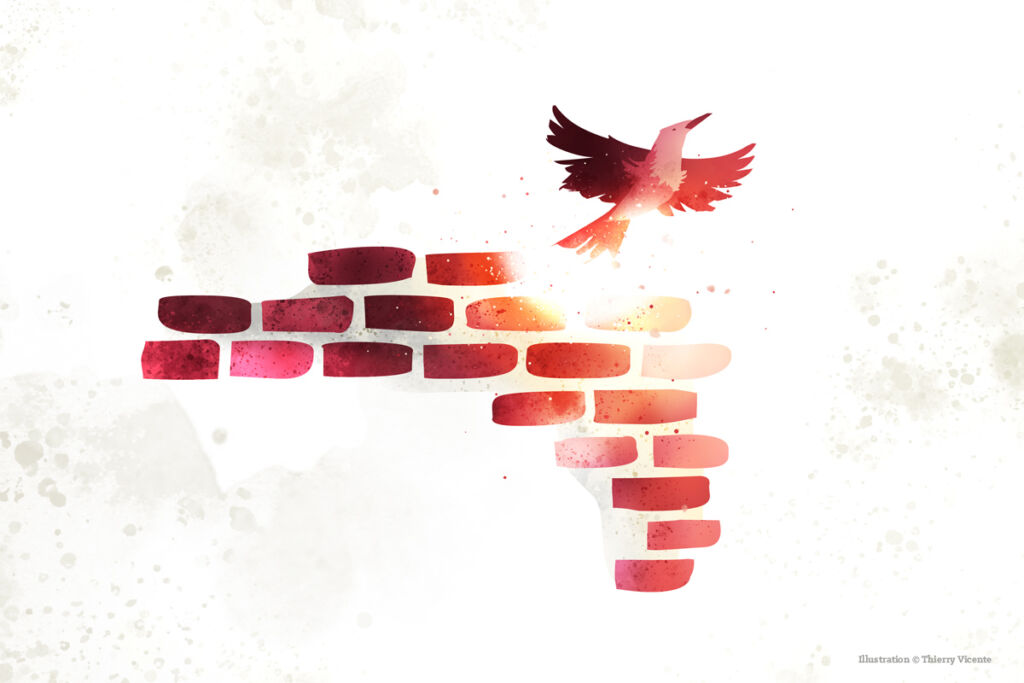[LUM#13] School: another brick outside the walls
Has lockdown shaken the foundations of the school system? Temporarily removed from the school environment, teachers and families in working-class neighborhoods have sometimes managed to come together and build new relationships, far removed from their usual perceptions of each other.

" We want to show that in the face of a common difficulty, namely the pandemic, we are seeing a marginal change in the types of relationships that characterize school," explains Geneviève Zoïa, an anthropologist and member of Cepel*. During lockdown, the researcher looked at the relationships between parents and teachers in working-class neighborhoods, notably in Clichy-sous-Bois and the Mas de Mingue neighborhood in Nîmes.
"Something has happened," says the anthropologist, who also draws on fieldwork by Julie Gameros and Tiphaine Adeline-Rousseau, two master's students. While it is too early to conclude that these changes will become a permanent feature of the school landscape, certain characteristics of our education system do seem to have been shaken by this crisis. Starting with the verticality of the relationship between the institution and families, often built around the problems of the child and parents who struggle to support them.
Breaking down stereotypes
"During lockdown, teachers and parents stepped outside the classroom walls and collaborated in ways that went beyond the child's difficulties. They were able to get to know each other outside the very hierarchical framework where the school always dictates the rules, and break down the negative perceptions they had of each other," explains Geneviève Zoïa. Distance learning thus allowed some families to realize that teachers genuinely cared about their children, and teachers were able to deconstruct the image of parents as consumers who were not very invested in their children's education.
Another principle challenged by lockdown is neutrality. A pillar of the French education system alongside secularism, neutrality implies , according to the researcher , "that school must be the same for everyone and that we therefore know nothing about each other's particularities." The introduction of virtual classrooms and regular communication between teachers and parents by phone or email has opened a window onto each other's everyday lives. This has often led to more personalized relationships and a better understanding of each student's individual circumstances.
"During this period, we observed a personalization of relationships," explains the researcher. "People sign their emails with their first names, we see younger siblings popping up during virtual classes, and we ask each other how we are doing when we call to give homework assignments. Here again, we see a deconstruction of purely neutral relationships in favor of something more personal."
Open the classroom
Teaching methods have also had to adapt to these new constraints. This has been a challenge for some teachers who are unfamiliar with digital tools and have had to learn "on the job." However, the results have been positive overall. "Several teachers say they want to adopt these new methods, which allow them to see their profession in a different light, to personalize their teaching more, and to better adapt to their students," observes the anthropologist.
Virtual classes, blog creation, WhatsApp groups , teacher tutorials for parents—for Geneviève Zoïa, "teachers opened up their classrooms and showed what they were doing at school, and on the other side, parents were surprised and grateful for the initiatives taken for their children. Some students also proved to be different in this new setting, "more independent and more active because they were less exposed to the gaze of others in a virtual classroom than at school. "
However, the anthropologist does not minimize the dropout rate, the difficulties in accessing digital technology, or the feeling of illegitimacy in supporting children that characterize the relationship between working-class communities and the school system. "We know that working-class families are less familiar with school codes. The virus has, of course, magnified phenomena that we are already aware of, but we must also look at what this situation, which is effectively experimental, has made possible in terms of change."
Towards a new narrative
According to the researcher, this could be a way to change the negative narrative that schools have had about themselves for years. This narrative is regularly fueled by " PISA surveys [Programme for International Student Assessment], which show us that French schools are discriminatory, by all the talk about the perpetuation of inequalities, by all the difficulties in changing, in implementing reforms..."
On the contrary, Geneviève Zoïa's work reveals that in particularly challenging circumstances, teachers and families have often been "able to adapt and come together to overcome the strong feeling in neighborhoods that divides schools into 'them' and 'us.'" This is a welcome observation! Far from breaking down the school, it adds a new brick to its construction.
Find UM podcasts now available on your favorite platform (Spotify, Deezer, Apple Podcasts, Amazon Music, etc.).
*Center for Political and Social Studies: Environment, Health, Territories (UM – CNRS)